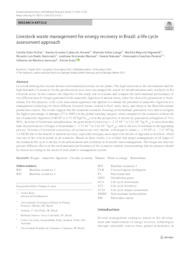Livestock waste management for energy recovery in Brazil: a life cycle assessment approach.
Livestock waste management for energy recovery in Brazil: a life cycle assessment approach.
Author(s): HOLLAS, C. H.; AMARAL, K. G. C. do; LANGE, M. V.; HIGARASHI, M. M.; STEINMETZ, R. L. R.; MARIANI, L. F.; NAKANO, V.; PEREIRA, A. S.; JANNUZZI, G. de M.; KUNZ, A.
Summary: Abstract: Livestock farming has exerted intense environmental pressure on our planet. The high emissions to the environment and the high demands of resources for the production process have encouraged the search for decarbonization and circularity in the livestock sector. In this context, the objective of this study was to evaluate and compare the environmental performance of two different uses for biogas generated in the anaerobic digestion of animal waste, either for electricity generation or biomethane. For this purpose, a life cycle assessment approach was applied to evaluate the potential of anaerobic digestion as a management technology for three different livestock wastes, related to beef cattle, dairy, and sheep in the Brazilian animal production context. The results suggest that the treatment scenarios focusing on biomethane generation were able to mitigate the highest percentage of damages (77 to 108%) in the global warming category when compared to the scenarios without the use of anaerobic digestion (3.00·102 to 3.71·103 kgCO2 eq) or in the perspective of electricity generation (mitigation of 74 to 96%). In terms of freshwater eutrophication, the generation of electricity (??2.17·10?2 to 2.31·10?3 kg P eq) is more favorable than the purification of biogas to biomethane (??1.73·10?2 to 2.44·10?3 kg P eq), due to the loss of methane in the upgrading process. In terms of terrestrial ecotoxicity, all scenarios are very similar, with negative values (??1.19·101 to ??7.17·102 kg 1,4-DCB) due to the benefit of nutrient recovery, especially nitrogen, associated with the use of digestate as fertilizer, which was one of the critical points in all scenarios. Based on these results, it is evident that proper management of all stages of the treatment life cycle is the key to decarbonization and circularity in livestock waste management. The biogas use does not present different effects on the environmental performance of the scenarios studied, demonstrating that the purpose should be chosen according to the needs of each plant or management system.
Publication year: 2024
Types of publication: Journal article
Unit: Embrapa Swine & Poultry
Observation
Some of Embrapa's publications are published as ePub files. To read them, use or download one of the following free software options to your computer or mobile device. Android: Google Play Books; IOS: iBooks; Windows and Linux: Calibre.
Access other publications
Access the Agricultural Research Database (BDPA) to consult Embrapa's full library collection and records.
Visit Embrapa Bookstore to purchase books and other publications sold by Embrapa.

